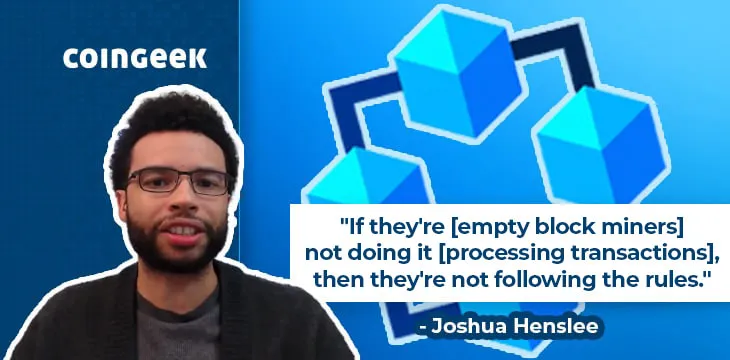|
Getting your Trinity Audio player ready...
|
If you’re involved in BSV, you undoubtedly know about the empty block miner. In his latest video, influencer and developer Joshua Hensleee explains why the empty block miner is not entitled to the subsidy.
A quick recap of the situation
Henslee begins by recapping the situation. A miner has been mining empty blocks on the BSV blockchain while not accepting transactions. They’re doing this to earn the subsidy, which Henslee emphasizes is indeed a “subsidy” and not a “reward.”
Henslee recalls that Satoshi Nakamoto himself was clear that transaction fees must replace the subsidy for the network to survive long term. This means there must be demand for transactions which the miners must put into a block and process to collect fees. What the empty block miner has been doing is mining blocks with no transactions in them, causing backlogs and network congestion.
This action has prompted a response from the Bitcoin Association for BSV, threatening to take legal action against the responsible parties and urging nodes to freeze the miner’s transactions.
The empty block miner is taking payment for work they aren’t delivering
Henslee says that, after he calmed down and became more lucid about the situation, he thinks Dr. Wright’s thoughts on what is going on are profound and worth exploring.
Many in the BSV ecosystem think that Dr. Wright saying the fees must be lowered is the same thing as telling miners they must accept lower fees. However, his response is to tell them not to mine at all. Some are unhappy that Dr. Wright should have any say regarding what fees are acceptable, noting that the empty block miner has accepted some transactions at higher fees per byte.
Henslee thinks the situation is slightly different than it is widely perceived. He gives an admittedly imperfect analogy: the situation is similar to an employee on $100,000 per year then refusing to do any work and insisting on earning more. He points out that Bitcoin nodes are supposed to collect transactions into blocks, and this empty block miner isn’t doing that despite being paid to do so.
As for the argument that honest nodes should orphan the dishonest one, Henslee says he is starting to agree with this. This node is being paid to do work and is not fulfilling its end of the bargain.
Bad times in BSV
On a slight tangent but an important one, Henslee notes that this is the worst atmosphere he has seen in BSV for a long time. This is due to a confluence of factors. First, the verdict in Granath v Wright in Norway was less than ideal, but on top of that, this attack led to BSV deposits and withdrawals being stopped on multiple exchanges like Robinhood, and the empty block miner and the Bitcoin Association’s response has created a negative PR scenario, Henslee says.
That said, Henslee states this situation with the empty block miner is a learning experience.
“If they’re not doing it [processing transactions], then they’re not following the rules,” he remarks.
Honing in on the specifics of Dr. Wright’s argument and the misunderstanding occurring in BSV, he notes that what he’s actually expressing is, “don’t take the subsidy.” Thus, he’s not trying to force them to accept lower fees but is saying that if they take the subsidy, they must process some transactions.
Once again, Henslee reminds us that code is not law. This fallacy has been at the heart of much of the digital currency industry since its inception. Since this empty block miner is accepting payment, they must do the work, and those are the terms of the contract.
On the BCH empty block situation
Some people have pointed out that Dr. Wright once claimed mining empty blocks is fine. In fact, he wrote an article stating exactly that.
However, Henslee points out that the context of this article was about Bitcoin Cash (BCH). Since they tried to change the ordering of the transactions and other rules, they became an invalid chain. Therefore, this action is justified to protect the legitimate Bitcoin chain. Henslee knows some people won’t accept this argument, but he does.
On a potential solution to the situation
Henslee says he is coming around to the idea that honest nodes like TAAL (CSE:TAAL | FWB:9SQ1 | OTC: TAALF) and GorillaPool should orphan the empty block miner and start processing transactions again. This will cause the empty block miner to stop, as they will be mining an invalid chain with no transactions.
“I didn’t think it was plain and simple two days ago, but I do now,” Henslee says, wrapping up the video. He finishes with the point that you wouldn’t know the fees are too low when the blocks aren’t even full.
Key takeaways from this video
- An unknown miner has been mining empty blocks on Bitcoin SV while refusing to accept transactions. This is causing network congestion.
- The BSV community is divided on whether or not this is acceptable. Dr. Craig Wright and the Bitcoin Association are clear that it is not.
- After some reflection, Joshua Henslee has come around to the idea that it is not acceptable. It violates what Bitcoin miners are being paid to do with the block subsidy.
- The atmosphere in BSV is terrible right now. The empty block miner is not helping the situation.
- Henslee is coming around to the idea that honest nodes should orphan the empty block miner and continue processing transactions on the valid Bitcoin SV chain.
Watch: The BSV Global Blockchain Convention panel, Blockchain mining & energy innovation

 07-09-2025
07-09-2025 





